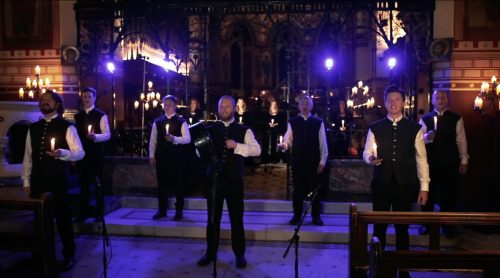
 Ireland Live from London Christmas – A Whisper of Paradise: Anúna. St Bartholomew’s Church, Dublin, recorded in December 2020 and livestreamed (for information click here) on 20.12.2020. (CC)
Ireland Live from London Christmas – A Whisper of Paradise: Anúna. St Bartholomew’s Church, Dublin, recorded in December 2020 and livestreamed (for information click here) on 20.12.2020. (CC)
Trad. – The Wexford Carol
Anon. – Quis Est Deus
Flecha – Villancicos d Diversos Autores (1556): Ríu Ríu Chíu
Trad. (Irish) / McGlynn – An Oíche
McGlynn – Dúlamán
Kirkpatrick – Away in a Manger
St Godric – St. Nicholas
Trad. (Irish) – Siúil a Rúin (arr. M. & J. McGlynn)
McGlynn – Song of the Wind
Anon. – Piae Contiones (16th-century): Gaudete
McGlynn – Celtic Mass: Sanctus
Adam – O Holy Night
Trad. (French) – Noël Nouvelet
McGlynn – Midnight
McGlynn – Pie Jesu
Encore: Danny Boy
Next year Anúna has been extant for full 34 years. To a certain extent, it has stood outside of ‘traditional’ choral music. Like VOCES8, and like Manchester Collective, there is more than a hint of redefining genres. As the concert unfolded, it became obvious there was another level of unanimity of intent here; Anúna is almost a group of soloists who come together as a close-knit performing community.

The film, throughout, is very atmospheric: a church bell tolls, a young lady with a candle approaches an altar and starts singing with a voice of purity but also of seemingly eternal knowing, it is in fact Aisling McGlynn that initiates this Yule celebration. As The Wexford Carol continues, her peers join her; a musical journey of warmth and hope intercut with shots of the beautiful stained-glass windows of St Bartholomew’s Church, Dublin.
Rory Musgrave introduced the evening in his rich, bass voice. Based on a medieval Irish-Latin text, Quis est Deus? (Who is God?) boasted Andrea Delaney and Nejc Rudel as soloists: vocal lines seemed to spin off into a choral milieu, accompanied by sumptuous visuals of the church ceiling and a stained-glass depiction of the Lamb of God and, later, of the windy Irish seafront. The soloist asks “Et ubi est Deus?’ (And where is God – another pertinent question for our times, perhaps), we see the choir arranged in what looks like a ritual formation of a female circle surrounded by a male semicircle.
Rory Musgrave has a fabulous voice – and diction – as the earthy contrast of the drumbeat accompanied Ríu Rīu Chíu from a mid-16th century collection confirmed; the performance was so alive it could have been written yesterday. This is one of the exceptions to the rule of what a carol is supposed to sound like – a ‘dramatic carol’.
A story of two lovers who meet on a cold Irish winter’s night, An Oíche (The Night) takes a traditional 18th-century Irish text, set to music most beautifully by Michael McGlynn – some beautifully elided harmonic progressions give the music a very characteristic flavour. McGlynn’s music for the courting song Dúlamán, a vibrant song the text of which might well have been sung while gathering seaweed on the barren West Coast of Ireland. Fergus Cahillane was the soloist, the ripeno, as it were, fanning away from him in formation.
Quite a change to move to Away in a Manger, with Anúna’s youngest member, Lauren McGlynn, a sweet-toned soloist, the very epitome of innocence. Even this well-known piece, pretty much omnipresent at this time of the year, exuded the characteristic signature of Anúna’s rich, velvety sound.
St Godric wrote Saint Nicholas in the middle part of the 12th century; another ritualistic, almost primal number, Anúna captured its essence perfectly; as they did the traditional Irish Siúil a Rúin (Go, my love), a song that dates to the 17th century Jacobite rebellion and features the lovely voice of Sorcha Fenlon. A song of lament, the atmospheric Anhrán na Gaouithe (Song of the Wind) by McGlynn seems the perfect prolongation (with some beautiful film of the sea). Performed with the singers in a perfect circle, this is a thing of rare beauty.
It is the alternation between interior and the exterior musics that makes this concert so exciting. The call and response Gaudete from the 16th-century Finnish Piae Contiones. and the Sanctus from McGlynn’s Celtic Mass exuded a blissfully timeless quality in slow-moving lines and grounding drones; it was as if the music zoomed into focus with O Holy Night (and how pure were Anúna’s sopranos here, just as the single lines that opened Noel nouvelet held infinite power to move).
The incredibly touching Midnight to a poem ‘The Soldier’s Grave’ by Francis Ledwidge (1887-1917) offers an extra layer of poignancy. The poet was killed at a young age in the Battle of Passchendaele during the First World War. It is one of several Ledwidge poems set by McGlynn; similarly by McGlynn, his Pie Jesu is dedicated to all those affected by the current situation (it was originally written in 1998 in memory of those affected by the Omagh bombing.). The familiar words clearly bring the best out of composers (one just has to think of the Pie Jesu from Fauré’s Requiem).
In the manner of an encore, Danny Boy was offered to VOCES8.
Anúna’s sound is individual, instantly recognisable, and clearly finely honed. Members of Amazon Prime might like to note that several of Anúna’s albums are available for free streaming: including Revelation, Sensation, Celtic Origins and A Christmas Selection; Spotify is another fertile outlet.
Colin Clarke
